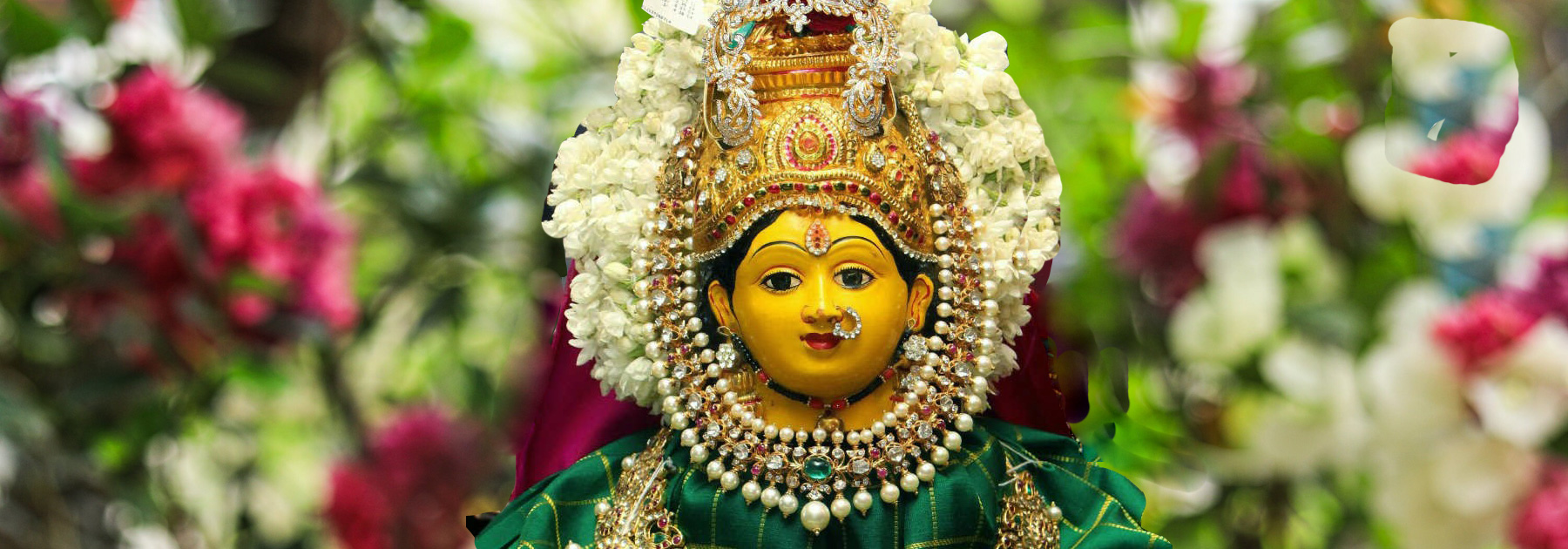Sharad Navaratri
Navaratri literally means nine nights. It is celebrated during Sharad Ritu, so it is also referred as Sharad Navaratri. Navaratri also signifies slaying of demon Mahishasura by Goddess Durga and the tenth day is celebrated as Vijayadashami, the day on which Sri Rama won the battle against Ravana and recovered Sita, and also the day on which Arjuna alone defeated the entire Kuru army in Virata war. Goddess mother will be worshipped in various forms like Durga, Lakshmi, Saraswati with great devotion during Navaratri.
Navaratri is celebrated from Aashweeja Shukla Padya (Aashweeja or Ashwin masa Shukla Paksha Padya tithi) to Aashweeja Shukla Navami, and the 10th day, on Dashami is Vijaya Dashami.
History
There was a demon king named Mahishasura. He had the blessings of Lord Brahma and therefore started a rampage of fear and destruction everywhere. Over time, excessive pride overpowered him. However, the demon did not realize that excessive pride has always led one to destruction. In the reign of terror, the Gods feared that the demon would soon conquer the entire universe and therefore approached Trimurtis- Brahma, Vishnu, and Maheshwara and explained the situation to them. According to legend, the three Gods - Brahma, Vishnu, and Maheshwara – created a powerful Goddess Shakti for slaying of the buffalo demon Mahishasura. Shakti is a Sanskrit word which means power. Since the power of all the gods was united to form the Goddess, she was named Shakti.
Thus formed, the powerful Goddess, armed with inner strength, courage and wisdom with arms gifted by the powerful Devas set out on a lion to destroy Mahishasura. The battle started between Goddess Durga and the demon Mahishasura and went on for nine days and nine nights. And finally the Goddess, with her inborn power and acquired weapons, killed Mahishasura on the tenth day. These nine days came to be known as Navaratri and the tenth day as Vijayadashmi.
In the Ramayana, Rama kills Ravana in a fierce battle and ends evil rule on the earth. Vijayadashami festival also commemorates the victory of Rama.
In the Mahabharata, on the same day, Arjuna alone defeated the entire Kuru army in Virata war. Vijaya is one of the names of Arjuna, and the day became popular as Vijayadashami. The festival also celebrates the victory of ever victorious Arjuna.
Customs
Though Vijayadashami also remembers the victory of Rama and Arjuna, the Navaratri festival is mainly dedicated to Devi and different facets of Devi. During Navaratri, all the family members, relatives gather together at ancestral home. All 10 days are celebrated in a grand style at ancestral home. For extended families first 6 days are low-key observance and actual celebration starts from Sharada Sthapana day on Saptami tithi.
During Navaratri, people observe complete or partial fast. The complete fast is with no food at all. Partial fast is by refraining from specific food like rice, grains, and specific vegetables like onions. Instead, only fruits, vegetables, milk, and milk products are consumed. Some people observe oppattu that is taking food during breakfast, and lunch, but skipping or consuming only falahara (fruits) at dinner.
Goddess is worshipped with varied and unique decorations on each day. Aarati plates are designed everyday with new designs. Various dishes are prepared for Naivedya. Pooja is done reciting mantras, shlokas, and singing devotional songs.
Sharada Sthapana is on Saptami – 7th day of Navaratri. Goddess of wisdom and learning is also known by the name of Sharada. Sharada pooja is performed to pay reverence to Goddess Saraswati. Children and students keep their textbooks for Pooja, to get the blessings of Goddess Saraswati.
The 8th day of Navaratri is Durgashtami (Durga Ashtami). The day is attributed to Goddess Durga who is symbolic of eternal power.
Maha Navami is the 9th day of the Navaratri festival and is the final day of Navaratri before Vijaya Dashami.
The 10th day of the festival is Vijaya Dashami. After pooja, Sharada visarjana is done. Children and students remove their books which were kept for pooja on Saptami - Sharada Sthapana day, and read few pages of the book. Everyone at home will read and write few lines on the occasion.
